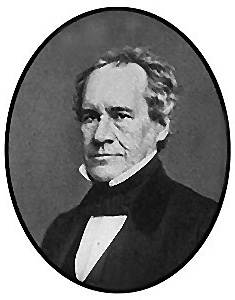∞∞∞∞∞∞∞
Sections: Biography Criticism Letters Bibliography
∞∞∞∞∞∞∞

Charles Anthon
(Born: November 19, 1797 - Died: July 29, 1867)
American educator and classical scholar. Charles Anthon was born in New York City, the ninth of twelve children of Dr. George Christian Anthon (1734-1815) and Mrs. Geneviève Jadot Anthon (1763-1821). (G. C. Anthon was born in Salzungen, Germany, and Miss Jadot in Detroit, MI. They were married in Detroit, MI, on July 18, 1778. Their marriage certificate apparently records the fact that the bride held a doll in her arms. G. C. Anthon’s first wife, Mary Ann Navarre died childless in 1773. G. C. Anthon came to New York in 1757 as a British prisoner of war. In 1760, he was taken to Detroit in 1760, and commissioned as a surgeon-general in the 60th Regiment of the American Royals in 1761.)
Charles Anthon graduated from Columbia College (now Columbia University) in 1815. In 1820, he returned to Columbia as an assistant professor of Greek and Latin, a position he held until 1850, when he partially retired. A stroke forced him to fully retire in 1867, a few weeks before his death. (He was one of only six professors at the college when he first joined the faculty.) He also served as rector of the Columbia Grammar School (where he was known to regularly punish bad behavior or poor scholarship with the swift application of a piece of rattan), and authored over fifty books.
In his “Marginalia,” Poe speaks of Anthon with a degree of praise unusual in his critical writings: “As a commentator, Professor Anthon has evinced powers very unusual in men who devote their lives to the hortus siccus of classical lore. He has ventured to dismiss the pedant and look en homme du monde upon some of the most valued of the literary monuments of antiquity. The abundant Notes to his Classics will do him lasting honor among all who are qualified to give an opinion of his labors, or whose good word and will he would be likely to consider as worth having. His accuracy is extreme.” The one critical note Poe offers is “The only noticeable demerit of Professor Anthon is diffuseness, sometimes running into Johnsonism, of style.”
Poe’s prospectus for the Stylus of January 1848 notes, “The most distinguished of American scholars has agreed to superintend the department of classical letters.” In a letter to G. W. Eveleth of February 29, 1848, Poe identifies “The ‘most distinguished of American scholars’ ” as ‘Prof. Chas. Anthon, author of the ‘Classical Dictionary’.”
∞∞∞∞∞∞∞
- Review of Sallust’s Jurgurthine War
- Text-01 — Review of Sallust’s Jurgurthine War — May 1836, no original manuscript or fragments are known to exist (but this version is presumably recorded in Text-02)
- Text-02 — Review of Sallust’s Jurgurthine War — May 1836 — Southern Literary Messenger
- Review of Select Orations of Cicero
- Text-01 — Review of Select Orations of Cicero — 1837, no original manuscript or fragments are known to exist (but this version is presumably recorded in Text-02)
- Text-02 — “Review of Select Orations of Cicero — January 1837 — Southern Literary Messenger)
- Review of A Dictionary of Greek and Roman Antiquities
- Text-01 — Review of A Dictionary of Greek and Roman Antiquities — 1845, no original manuscript or fragments are known to exist (but this version is presumably recorded in Text-02)
- Text-02 — Review of A Dictionary of Greek and Roman Antiquities — April 12, 1845 — Broadway Journal
- Text-03 — Review of A Dictionary of Greek and Roman Antiquities — May 1845 — Southern Literary Messenger
- Notice from “Autography”
- “Chas. Anthon” (“Autography” - part II) — August 1836 — Southern Literary Messenger
- “Chas. Anthon” (“A Chapter on Autography” - part I) — November 1841 — Graham’s Magazine
- Notice from “Marginalia”
- “[Charles Anthon]” (“Marginalia” - part VI) — April 1846 — US Magazine and Democratic Review
- Notice from “The Literati”
- “Charles Anthon” (“The Literati of New York City” - No. II) — June 1846 — Godey’s Lady’s Book
- “Charles Anthon” (“The Literati”) — 1850 — WORKS
∞∞∞∞∞∞∞
- C. Anthon to E. A. Poe - June 1, 1837
- E. A. Poe to C. Anthon - about October - November 2, 1844 (OL#186) (draft copy)
- C. Anthon to E. A. Poe - November 2, 1844
∞∞∞∞∞∞∞
- Anonymous, “Obituary: Charles Anthon, LL. D.,” New York Times, July 30, 1867.
- Anthon, Charles Edward, Narrative of the Settlement of George Christian Anthon in America, New York: Bradstreet Press, 1872 (revised by Marshall Davies Lloyd, 1999).
- Heartman, Charles F. and James R. Canny, A Bibliography of First Printings of the Writings of Edgar Allan Poe, Hattiesburg, MS: The Book Farm, 1943.
- Mabbott, Thomas Ollive, ed., The Collected Works of Edgar Allan Poe (Vols 2-3 Tales and Sketches), Cambridge, Mass.: The Belknap Press of Harvard University Press, 1978. (Second printing 1979)
- Reece, James B., Poe and the New York Literati: A Study of the “Literati” Sketches and of Poe’s Relations with the NewYork Writers, unpublished doctoral dissertation, Duke University, 1954.
- Thomas, Dwight and David K. Jackson, The Poe Log: A Documentary Life of Edgar Allan Poe 1809-1849, Boston: G. K. Hall & Sons, 1987.
- Wilson, James Grant and John Fiske, eds., Appleton’s Cyclopedia of American Biography, New York: D. Appleton & Co., 1889, 1:80-81 (a brief discussion is inserted in an article on John Anthon).
∞∞∞∞∞∞∞
[S:0 - JAS] - Edgar Allan Poe Society of Baltimore - People - Charles Anthon